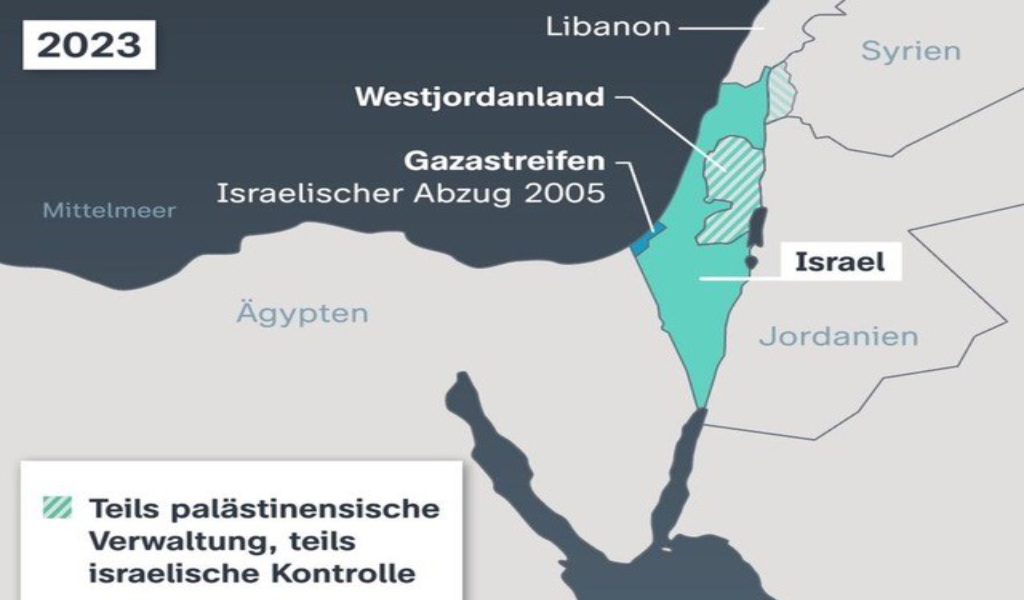A state of their own: The Palestinians’ missed opportunities
From the FokusIsrael.ch editorial team
In the last 80 years or so, there have been repeated offers to the Palestinians ((80 years ago nobody spoke of Palestinians, only Arabs)) for a state of their own. But they have rejected them all. Here is a brief overview of the missed opportunities for state independence.
1947 UN partition resolution. On November 29, 1947, the UN General Assembly adopted Resolution 181 (II). This postulated a Jewish state, an Arab state and the internationalization of Jerusalem. While the Jewish side agreed to the plan, the Arab side rejected it.
On May 14, 1948, when the state of Israel was proclaimed, the Arab side opted for a military solution just one day later and attempted to destroy the newly founded Jewish state. The war lasted over a year and ended in July 1949 with Israel’s victory over the armies of Egypt, Syria, Jordan, Lebanon and Iraq.
The West Bank, designated by the UN as part of the new Arab (Palestinian) state, fell under Jordanian rule, as did East Jerusalem. Gaza, also designated as part of the new Palestinian state, was occupied by Egypt. (In the Six-Day War of 1967, the West Bank and Gaza then fell to Israel and from then on were considered occupied territories under international law).
2000/2001 Camp David. Under the leadership of then US President Bill Clinton, the President of the Palestinian Authority, Yasser Arafat, and the then Israeli Prime Minister Ehud Barak negotiated the establishment of a Palestinian state. (The Palestinian Authority was created as a result of peace talks in Oslo in 1993. It was responsible for the administration of most of the West Bank and Gaza).
The Clinton peace plan envisaged that all of Gaza and 94-96% of the entire West Bank would become a Palestinian state. In addition, Israel was to cede 1-3% of its own land on the West Bank to the new Palestinian state so that Gaza and the West Bank could be connected by a land bridge. The Arab parts of Jerusalem were to be placed under Palestinian administration and the Jewish parts under Israeli administration. In addition, an international aid fund of US$ 30 billion was to be created for the Palestinians.
Prime Minister Barak and the Israeli government agreed to this plan. Yasser Arafat also declared his agreement. However, he attached so many conditions to his agreement that it ultimately became impossible to implement the plan. The Saudi ambassador to the USA, Prince Bandar bin Sultan, said: “If Arafat does not accept what is now being offered to him, then it is not a tragedy, but a crime (against his own people, ed.).” This attempt to establish a Palestinian state thus also failed.
2005 Sharon Plan. In 2004, the then Israeli Prime Minister Ariel Sharon announced that Israel would withdraw completely from Gaza and also evacuate all settlements there. Israel would also dismantle four settlements in the West Bank. This should pave the way for a solution to the conflict with the Palestinians. The plan was implemented in 2005, whereby the Israeli settlers in Gaza were forced to leave Gaza with the help of the Israeli military.
Sharon’s hope that Israel’s unilateral withdrawal from Gaza and part of the West Bank would pave the way for peace with the Palestinians proved to be a fallacy. Two years later, Hamas, elected by its own population, took power in Gaza after a bloody power struggle with the PLO, which ruled the West Bank, and began to terrorize Israel from there with rocket attacks and assassinations. This culminated on October 7, 2023 with the massacre of 1,200 Israeli babies, children, women and men within Israel’s borders and the abduction of over 250 hostages, which led to the Gaza War.
2008 Peace offer from Ehud Olmert. Three years after Israel’s withdrawal from Gaza, Ehud Olmert, who had succeeded Sharon as Israeli Prime Minister, made another peace offer to Yasser Arafat’s successor as President of the Palestinian Authority, Mahmoud Abbas.
Similar to the Clinton plan of 2002/2001, Olmert’s offer also provided for an exchange of territory between Israel and the new Palestinian state. Both sides were to cede exactly the same amount of land to each other.
Accordingly, 6.3% of the West Bank was to be transferred to Israel so that the Israeli settlers there could be integrated into Israeli territory. For its part, Israel would have given the new Palestinian state a piece of its own territory equivalent to 5.8% of the West Bank. In addition, a further part of Israeli territory (amounting to 0.5% of the West Bank) was to be ceded in order to connect the West Bank and Gaza by means of a land bridge and create a contiguous Palestinian state. Today, Israel has an area of just over 20,000 square kilometers, making it half the size of Switzerland.
However, like his predecessor Arafat, Mahmoud Abbas also rejected this proposal to create an independent Palestinian state.
In an interview with “Weltwoche” in July 2025, former British Prime Minister Boris Johnson said: “The history of Palestine since 1948 is a history of missed opportunities, of the failure of Palestinian leadership and a complete lack of understanding of the need for coexistence with Israel. There has never been a Palestinian leader willing to say: “Israel has an absolute right to exist. We must coexist with Israel.”


